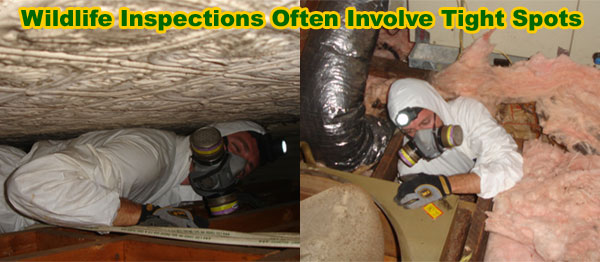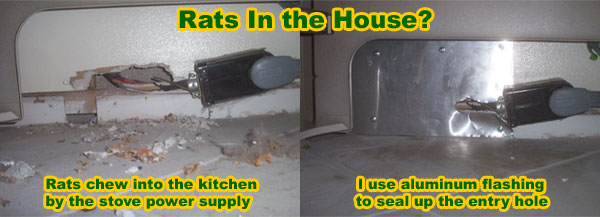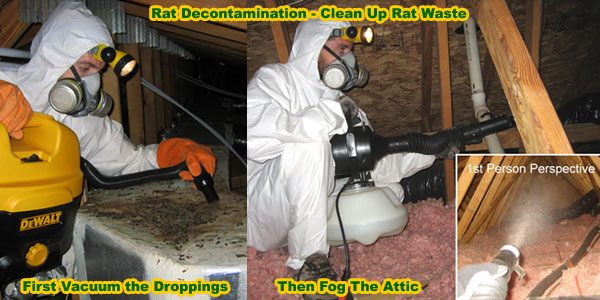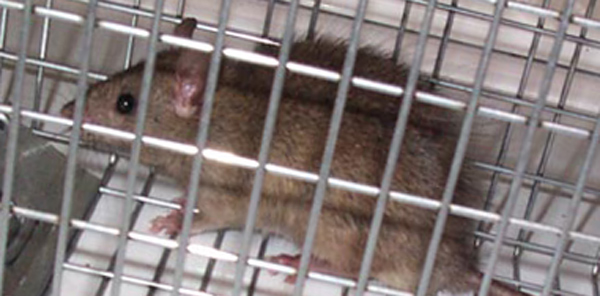- info@wildlife-removal.com
Call us for help in your town
Wildlife Removal Education
Rat Prevention Tips for the Home
Need rat removal in your hometown? We service over 500 USA locations! Click here to hire us in your town and check prices - updated for year 2020.
This article primarily deals with my specialty, which is rats in buildings, and inside houses - in the attic, walls, crawlspace, etc. But I do address general
outdoor rat prevention tips as well. I should warn you up front that it's not a quick and easy task. There is no quick-n-easy rat repellent product or rat prevention
device that will get
the job done for you. If at any time you think you may need professional assistance or animal services, click in my map of hundreds of Professional Rat Removal Companies
throughout the USA. But read the below for education, tips, and
methods. Read more about Rats & Insurance: Will I Have to Pay?
The most important concept in rat prevention is to eliminate the things on your property that attract rats. Namely, food and shelter. The first one is
obvious - don't leave out garbage that rats can access, pick up fallen fruit from fruit trees, do not leave pet food outside, etc. But I must warn you - even with a sparkling clean
property with seemingly no food at all, there may still be rats roaming about outside. And really, that's not a big deal. The thing is, you don't want those
rodents getting into your house. Rats can cause considerable damage once inside a house or attic.
So you must eliminate the shelter, namely your home. The way you do that is to find out how the rats are getting in your
building in the first place. This requires a very careful and detailed inspection of the entire structure, ground to roof peak. A knowledge of rodent behavior, and
they types of common entryways, helps. Rooflines, eaves, vents, siding gaps, electrical line entrance, plumbing, there are so many areas rats can use to gain
access into the home. But the good news is that yes, 100% of these areas can be found and sealed shut with steel.

Below is a good example of a repair to keep rats out of the house. They were living in the attic and walls of the house.
They were climbing down the electrical line to the power supply for the oven, for which a small hole is cut in the wall. Rodents can smell the air coming through
on the other side, and a kitchen has scent of food, so they gnaw through the drywall, as you can see. I installed a metal plate so that no rats could get into
the kitchen again. But of course, that's solving only part of the problem.

Once you have inside areas like that sealed, the more important thing is to repair the outside areas that let them in the building in the first place. Then and only
then, you need to trap the rats. To do so before the building is sealed is a waste of time. Please read my rat trapping
guide, which will tell you the best ways how to get rid of rats. You do ultimately have to
kill rats, but when you do, make sure it's done in a humane, and most of all EFFECTIVE manner. Never use shoddy techniques,
or poison.

After the rats are all gone and no more can get in, doing a cleanup job is actually a very important part of the prevention process. Rats leave behind a strong scent with their
fur grease, urine, and droppings. You need to vacuum up all the rat feces, and fog the attic with a special enzyme cleaner that
destroys the urine and pheromone scent from their fur oil. If future rats detect this scent, they'll try hard to gnaw their way into your house or attic.
Finally, I want to say that in regard to professional rat removal, if you decide to hire a company, absolutely DO NOT hire
a traditional pest control company. They don't do any preventative work. They want to sign you up for a never-ending
monthly maintenance package, so they just set a few traps at the attic hatch, spread some poison around (and poison is a HORRIBLE idea - it doesn't solve the problem and
just results in dead stinking rats in your house) and they never seal the openings.
Read more about Is Professional Rat Control Really Worth It?
Now for some common rat prevention tips and methods:
Rat prevention in the attic - as with any area, deny them access to the building by repairing any openings bigger than a half-inch! In fact, just seal them all no matter what
the size - it'll keep out bugs as well.
Rat prevention in the barn - a barn is a lot harder, because it's a bigger, open structure, with animal food. Your best bet is to keep the barn as clean as possible.
Rat prevention in the compost - try to contain it or isolate it, otherwise
the rodents will come and have a field day.
Rat prevention in the garage - just make sure the door is shut at night, and that it shuts tightly. Check the corners of the garage door for openings, and if you need to
install a new rubber strip, do so.
Rat prevention in the garden - this is a tough case. There is no good rat repellent device like a noise maker, sound machine, or anything that'll just keep them away. A cat is
actually the best prevention for an outdoor area like this.
Rat prevention in the house or home - as stated, it doesn't even matter if things are clean, so long as the home is sealed shut.
Rat prevention in the kitchen or restaurant - same thing. The only real thing that matters is a lack of open access holes into the building in the first place. If that's an impossible task for you,
hire one of my pros, or check the areas behind the oven and fridge, anywhere there are openings from the walls into the kitchen space.
Rat prevention in the yard - no dice here. Rodents live outside. The best you can do is to keep things as clean and debris-free as possible. And a cat does actually help here.
Rat Prevention Tips - Rats eat and contaminate food thereby spreading diseases and parasites such as fleas and ticks that can infect people and household pets. They also damage properties. Rats have great instincts and can spot a bait or trap most of the time, they therefore stay in hard to reach places in the roof, attic, or spaces between the walls. Being rapid breeders, it is not easy to eliminate rats, plus the small ones can squeeze through the tiniest of spaces, resulting in a full blown infestation within a short period. Read about What Does a Rat Trapper Do With Rats?

It is a lot easier to prevent rats from entering a house than to try and eliminate them after an infestation. There are several ways to guide against rats:
Fences
A good fence will keep rats out of a house. Wooden fences are of little use though since rats can chew them out. Fences should be made of stone or metal and even then, they should be built very high since rats can climb. Also ensure that garbage cans are not kept close to the fence and even though they are, they must be in metal cans with secure lids so that rats don't get attracted to the scent. It is harder to keep them out when they can perceive food on the other side of the fence.
Home Repairs
Rats rarely stay inside a house, they only come in during their active hours, which is why it is hard to eliminate them, add that to the fact that they have good instincts and are quite smart.
Rats gain entrance to the house from the outside, so it is advisable to repair all cracks and holes in the house that lead in from the outside. This would require you to walk round the house slowly and do a detailed check of the following:
- The foundation of the house - look for any opening; cover any hole you find no matter how tiny.
- Vents - check your roof and gables and cover any exterior vent with metal ware
- Clear all vegetation around the house, this include plants, grasses and even trees that are close to the house as rats can climb those trees and from there jump on your roof.
- Keep all garbage cans as far from the house as possible and use metal fitting cans that close securely
- All openings should be blocked with a wire mesh or rigid metal screen especially where you can't get a thick enough cloth.
All of this should be done in the afternoon when the rats are most likely not in the house but may have gone back to their nest. Remember, any small opening can spoil all of your effort, so ensure you close everything.
If the holes are too tiny for a wire mesh, fill it with a loose mesh and then pour adhesive or concrete down the hole, that way even if the rats chew through the adhesive, they'd still find it difficult to go through.
Natural Remedies
These are natural ways to eradicate rats from your home or dissuade them without using harmful chemicals.
Cats - If you own a cat, prevention of rats is easier as they are natural enemies. Your cat would need no prompting in hunting down this natural enemy.
Peppermint - Rats hate the smell of peppermint. If you do not have a peppermint plant, you can get some peppermint oil. Dab cotton balls into it and place it near holes where rats come from or can come in from. They will stay away.
Ammonia - Ammonia has a pungent smell that disturbs rats. Sprinkling of ammonia in their hole may just kill the rats.
Human Hair - Rats are afraid of our hair. Placing a clump of hair in their hole will kill them once they swallow some.
Pepper - Another remedy rats can't stand is pepper. They are unable to breathe when near pepper. The pungent smell of the pepper inflates their lungs and causes them to die. Try sprinkling some pepper near their holes.
Bay Leaf - Bay leaf may be an aromatic leaf for humans but when rats eat them, they choke on the leaf and subsequently die. Place some bay leaves in their hole.
Onions – putting some cut onion near a rat hole or potential entry point will drive it away or even kill it.
Sound - Sharp sounds make the ears of rats bleed and kills them instantaneously. Place your speaker near their holes.
Go back to the Rat Removal page.
Customer Rat Email: I noticed some 3-4 rats in my back yard. They were Never THERE before until i started throwing stale bread out for the birds. Needless to say,
I stopped throwing bread out now. I have 3 snap traps and caught 3 rats, but i still see a few each night. There is NO garbage or food around the house. I was told by a friend that
if i keep loading the traps with meat for the bait, which works great, that OTHER rats are going to smell the meat and come around, PLUS, he said he read where rats can communicate
with each other and their other rat friends where the food is, (in the traps) and others will come around. Now
I'm really confused. Do i still bait the traps, and try to catch more
rats, even though other rats can smell the meat where more rats could possibly come around, or do i just leave them alone and
hopefully they will leave if there is no food in the area
anymore. Is there anything I can do to prevent these rats from coming? Thanks
My Response: It's possible that there were always rats prior to the stale bread. If you stopped the bread, and they're still there, then the environment has adequate resources.
Trapping rats outside is kind of a losing battle. They will just keep coming and coming. I don't think that the traps will necessarily attract new rats, but it is true that rat
activity does seem to just cause more rats to come. Maybe you should stop trapping
altogether. If the rats aren't coming into your house, then maybe that's blessing enough, and
you can't worry about the presence of rats running around outside. No way to prevent that.


















